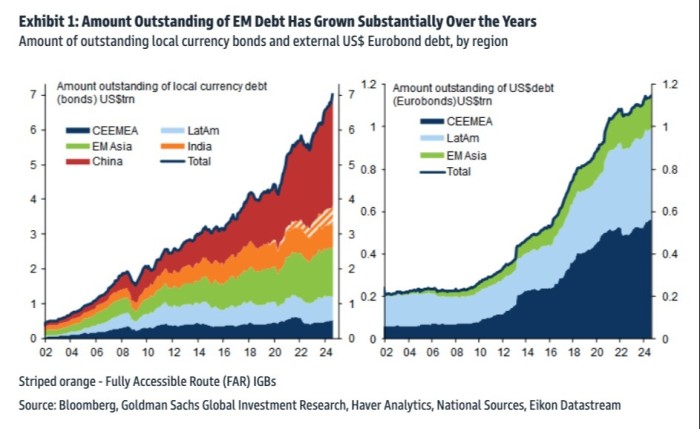This is an audio transcript of the FT News Briefing podcast episode: ‘US banks ride “soft landing” high’
Kasia Broussalian
Good morning from the Financial Times. Today is Monday, October 14th, and this is your FT News Briefing.
[MUSIC PLAYING]
Russian oil tankers are sailing past western sanctions. And we’re in the middle of earnings season for US banks. Plus, in Argentina, strict currency controls seem to have staying power. I’m Kasia Broussalian and here’s the news you need to start your day.
[MUSIC PLAYING]
A shadow fleet of oil tankers from Russia is thriving. So much so that its capacity to transport oil has grown by over 70 per cent since last year, that’s according to a new report out today. And the increase is in spite of a crackdown on shipping companies and insurers who have essentially allowed Moscow to get around western sanctions. Now, these were first put in place to limit Russia’s ability to generate revenues for its war in Ukraine. And they haven’t been that successful. Now, on top of that, the report also highlights the environmental risks of the fleet. These ships are old and because of the sanctions, under-insured. So oil spills and accidents are more likely to happen.
[MUSIC PLAYING]
We’re in the middle of another earnings season for US banks. JPMorgan Chase and Wells Fargo both beat expectations when they reported on Friday. The big investment banks, including Bank of America and Goldman Sachs, published later this week. To get the details and some insights, I have my colleague Josh Franklin here. Hey, Josh.
Joshua Franklin
Hi there.
Kasia Broussalian
So break down those two reports from Friday for me. What are some of the top line numbers?
Joshua Franklin
So I think the headline for JPMorgan and Wells Fargo that we saw on Friday was better than expected. Profits were down of both banks, but less than analysts and investors were fearing they would be. And I think a big part of that comes down to credit and loan losses being less severe than analysts were fearing they would be. As we kind of get past this period when a lot of people during the pandemic were sitting on large amounts of savings that have now been spent down and also now borrowers dealing with higher interest rates. And that was all really reflected in how their stocks performed. JPMorgan shares were up around 4.5 per cent on Friday, Wells Fargo was more than 5 per cent. And overall, one of the benchmark banking indexes hit the highest level since before the regional banking crisis with the collapse of Silicon Valley Bank in 2023.
Kasia Broussalian
All right. So that sounds pretty decent. And now these are the first reports since the Federal Reserve cut interest rates back in September. And that plays a big role in something called net interest income. What’s the outlook there given that rates are, you know, now falling?
Joshua Franklin
Yeah. And that’s been really one of the big concerns for bank investors is the extent to which lower interest rates would start weighing on big bank profits in particular, because these big banks have really benefited from being able to charge more for loans over the last two years without having to pay as high rates for savers on their deposits. And there was kind of a bit of a mixed bag in there for the banks. JPMorgan raised their guidance for net interest income in 2024. Wells Fargo cut their outlook for the final three months of the year. But Wells did lift their outlook for 2025, so being a bit more optimistic on things. JPMorgan didn’t give any outlook for what they expected to get from lending income in 2025, which was a little bit of a frustration on the earnings call. And even Jamie Dimon, the CEO of JPMorgan, told his CFO, next time, let’s just give them the damn number because they were getting so many questions about what net interest income was going to look like in 2025.
Kasia Broussalian
So we’re just halfway through this earnings season, the big investment banks, they report later this week. What are you looking for to better understand the health of the US banking sector overall?
Joshua Franklin
Well, I think we’re going to get like a different complexion of it. So we’ve got Goldman Sachs and Morgan Stanley reporting, and that’s gonna give us a little bit more of a flavour of the corporate world, a level of corporate confidence in terms of their willingness to do deals and appetite there. And I think that’s gonna continue to show pretty, from pretty anaemic levels 12 months ago, it’s gonna show pretty good year on year growth. The big theme is just how much of a recovery we’re seeing there and how sustained that’s gonna be.
Kasia Broussalian
Josh Franklin is the FT’s US banking editor. Thanks, Josh.
Joshua Franklin
Thanks very much.
[MUSIC PLAYING]
Kasia Broussalian
Concern is ramping up about inflation in Europe, but not in the way that you might expect. Economists are worried about it getting too low now thanks to weak economic growth and lower consumer price pressures. It’s a bit of a whiplash, right? Just last year, the European Central Bank raised interest rates to a record high and needed to bring down inflation that had really taken off after the pandemic. But it looks like things might be cooling too much. Eurozone inflation dropped to 1.8 per cent last month below the ECB’s 2 per cent target. And that’s giving some people a bit of déjà vu. Keeping inflation at 2 per cent has historically been kind of an issue for the bank. The ECB next meets on Thursday and investors are predicting it’ll drop rates by a quarter point. That would be sooner than originally anticipated.
[MUSIC PLAYING]
It’s almost been a year since a chainsaw wielding, sideburn rocking, libertarian economist took Argentina by storm. Javier Milei promised to slash spending, get inflation in line and crucially, lift currency controls when he became president. Michael Stott has been checking in on Milei’s progress and he’s here to talk to me about it. Hey, Michael.
Michael Stott
Hey, Kasia.
Kasia Broussalian
So tell me more about Milei’s time in office. What sort of progress has he been making on the economy?
Michael Stott
It’s a mixed picture, Kasia. I mean, I’ve just been in Buenos Aires. We had an interview with Milei and we got a sense of the country as it is now. Inflation has come down quite dramatically from the peak that it hit when he took office. He has also balanced the budgets. But there’s been a recession, too. Poverty rates have gone up. People are really feeling pain and the currency controls are gonna take quite a lot longer. He said that this was not the time to lift them and that he had several conditions that he wanted to see met first. So it’s a mixed picture.
Kasia Broussalian
Yeah. And tell me more about those currency controls. What’s the history with them?
Michael Stott
Yeah. So the currency controls were imposed actually by a centre right government back in 2019. Amid an economic crisis, there was a loss of confidence in the peso. And what they mean is that if you want to buy dollars in unlimited amounts, you’ve got to go to the black market to get them. There’s very strict controls on how many dollars you’re allowed to buy that you can move out of the country. And it was an emergency measure, but they’ve stayed ever since 2019 because the confidence in the peso has not returned. And it’s a high-risk gamble for Milei to lift them. Ideologically, he wants to lift them. He’s a libertarian. He wants economic freedom. But if he lifts them and dollars flat out, the peso’s value could crash. And then there’s a whole other burst of inflation. And his biggest achievement so far is undermined. So he’s very concerned about trying to find a balance there and looking for the right moment to do it.
Kasia Broussalian
Got it. And what are those conditions that Milei wants to see first and what would lifting controls actually do?
Michael Stott
So lifting the controls would help foreign investment. It would give foreign companies confidence that if they invested in Argentina, they could get their money out again. But Milei wants inflation to come down further. It’s still very high, and he wants to see banks lending their pesos out to companies instead of parking them in the central bank. That’s something as well he would see as a sign of money being put to work in the real economy instead of stored up somewhere where it might suddenly turn into dollars. So he’s looking for those sorts of things to happen before he lifts the controls.
Kasia Broussalian
And is this a setback for Milei? Like how much are these controls tied to him declaring, you know, essentially mission accomplished on the economy?
Michael Stott
It’s definitely a setback for him because he’s been so clear about his belief in total economic freedom. So he has to lift them at some point. The problem is that in a way, the longer he delays lifting them, the more the demand for dollars builds up in the system because multinational companies, for example, can’t send their profits back abroad. Some economists are quite concerned that he’s creating a bit of a hostage to fortune by waiting so long.
Kasia Broussalian
All right. But in the meantime here, I can’t help but think about how Argentineans, they’re really struggling. So how long do you think they’ll be willing to put up with Milei’s shock therapy?
Michael Stott
It’s a very drastic economic adjustment, one of the most drastic anywhere in the world. I think what’s helping Milei so far is that he’s doing, on the one hand, what he promised to do in the election campaign. He promised pain, he promised to chainsaw, that’s what people are getting. So he’s being honest in that sense and setting expectations. The other thing that’s helping him is a lack of alternatives. Frankly, the previous government was completely discredited by the huge economic mess it left behind. And nobody else has really articulated any serious alternative to what Milei is doing. The big question, of course, that nobody knows the answer to is how long that patience will last, and it could snap quite quickly at some point.
Kasia Broussalian
Michael Stott is the FT’s Latin America editor. Thanks, Michael.
Michael Stott
Thank you, Kasia.
[MUSIC PLAYING]
[CLIP OF A COUNTDOWN PLAYING]
Kasia Broussalian
SpaceX, the company run by Elon Musk, launched its rocket into the atmosphere on Sunday morning.
[CLIP OF A LAUNCH PLAYING]
But it wasn’t like most take-offs. The excitement was less about what was going up than what might be coming back down.
[NEWS CLIP PLAYING]
Everyone was watching to see if something called a booster would fall from the starship and land directly into the arms of the launch pad. And it worked.
[NEWS CLIP PLAYING]
The catch is crucial in order for SpaceX to reuse its rockets. So pulling it off was a major technical achievement.
[MUSIC PLAYING]
You can read more on all of these stories for free when you click the links in our shownotes. This has been your daily FT News Briefing. Make sure you check back tomorrow for the latest business news.














































































































































You must be logged in to post a comment Login